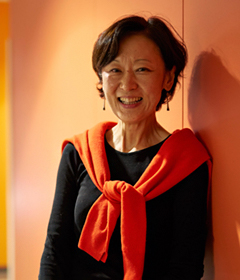Toward an era when women scientists worldwide can achieve their full potential
Yukiko Goda
Deputy Director, RIKEN Brain Science Institute
Team Leader, Laboratory for Synaptic Plasticity and Connectivity

It was twenty years ago in 1997 that I started my own laboratory as an Assistant Professor at the University of California, San Diego. After four years, I moved to University College London where I was a Senior Team Leader at the Medical Research Council Cell Biology Unit for ten years. In 2011, I returned to Japan to start my group in RIKEN.
Although my major in university was chemistry, my interest gradually shifted to biology, and as a PhD student at Stanford University, I studied the mechanisms of intracellular protein transport. For postdoctoral work, I wanted to address how cell-cell interactions shape macroscopic functions, and I switched my field to neuroscience. Today, I serve as a Senior Team Leader at the Laboratory for Synaptic Plasticity and Connectivity.
Synapses, specialized microscopic points of contact between nerve cells, play a crucial role in communication in the brain. Information transmission across synapses is highly dynamic, and plasticity of synapses is important for all sorts of brain functions from computation to learning and memory. Yet, how exactly synaptic plasticity drives dynamic changes in specific nerve cell circuits to control brain function and behavior is not yet well understood. Our laboratory aims to understand fundamental aspects of nerve cell circuits by observing individual synaptic actions. We also hope to contribute new insights into the basic mechanisms underlying neurological diseases.
Promoting the visibility of women in science
I have been engaged in research for a long time, and increasingly I have come to think more deeply about environments and settings in which women scientists could thrive better. Having experienced various cultures and different work attitudes of the world in my career thus far, I realize that women scientists today continue to face problems that are universal.
We are still a minority in the science world. For example, I often find myself as an only woman at meetings. Women scientists should not hesitate to express their opinions and work on their own initiatives. Towards this end, I feel it is vital to create an environment where women can partake in decision making and especially increasing the representation of women in committees.
Moreover, more women should be involved in different aspects of science in general. For example, I hope to see more female journalists with scientific backgrounds, and many more women promoted to higher bureaucratic posts in the Ministry of Education, Culture, Sports, Science and Technology (MEXT) and other ministries. One should also work hard to nurture scientific interest in young women at junior high school and high school levels. I believe improving the overall environment in this way will help encourage the visibility of women in science.
Understanding amongst people of different backgrounds and levels
At RIKEN there are many non-Japanese researchers. It is wonderful that there is cultural as well as gender diversity. I believe that creating a transparent platform is essential to understanding people coming from various backgrounds and across different levels. A few years ago, there was an interesting incident at the Riken Brain Science Institute. We held a special discussion session on equal opportunity where we had invited a prominent female speaker from abroad who was then a dean of a prestigious university. To our surprise and delight, we found that half of the participants were men. I hope this reflects a trend that will continue in the future.
(Affiliation and title as at March 2017)
